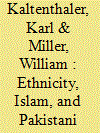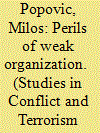| Srl | Item |
| 1 |
ID:
141295


|
|
|
|
|
| Summary/Abstract |
This article argues that an Islamist militant group with a relatively homogenous ethnic make-up is more likely to be supported by those of the same ethnicity even if the group makes no reference to and even downplays the importance of ethnicity. Using survey data from an original survey carried out in Pakistan in 2013, with 7,656 respondents, this hypothesis is tested in a multiple regression analysis of support for the Pakistani Taliban. The results demonstrate that co-ethnicity between the respondent and the Islamist militant group is the most important predictor of support for the militant group.
|
|
|
|
|
|
|
|
|
|
|
|
|
|
|
|
| 2 |
ID:
141293


|
|
|
|
|
| Summary/Abstract |
Targeted killing operations conducted outside Afghanistan have prompted debate regarding their lawfulness. For opponents of targeted killing operations, the debate tends to center on the number of civilians killed. Proponents respond by questioning the credibility and validity of the methods employed to determine the number of civilian casualties. This debate is important, but it also obscures the fact that the lawfulness of targeting killings is not determined by whether civilians were killed alone, while also lending legitimacy to unsubstantiated claims that the United States is engaged in an armed conflict with Al Qaeda and “associated forces.” This article classifies the hostilities in Pakistan, Yemen, and Somalia. It then applies the applicable body of law to targeted killing operations in each of these respective states based on how the hostilities were classified.
|
|
|
|
|
|
|
|
|
|
|
|
|
|
|
|
| 3 |
ID:
141294


|
|
|
|
|
| Summary/Abstract |
Why do some militant groups defect against their sponsors, while others remain loyal? Pakistan's sponsorship of Jaish-e-Mohammad and Lashkar-e-Taiba offers a controlled case comparison as the former turned its guns against Islamabad, while the latter remained obedient despite a similar strength, ethnic ties to the regime, and the presence of alternative supporters. What explains Jaish's defection and Lashkar's loyalty? Drawing on organizational and principal-agent theory, I argue that militant organizations that are more decentralized and factionalized are more likely to turn on their sponsors, because their weak command and control as well as dispersed decision making limit the militant leaders' ability to follow through on their commitments to the sponsors and makes it more difficult for the sponsors to discipline the militant organization. When a sponsor attempts to coerce such organizations into submission by detaining militant leaders, freezing or confiscating their material assets the rank-and-file is likely to turn guns against the sponsor.
|
|
|
|
|
|
|
|
|
|
|
|
|
|
|
|
| 4 |
ID:
141296


|
|
|
|
|
| Summary/Abstract |
Why and how do individuals residing in relatively peaceful and affluent Western societies come to embrace extremist ideologies that emanate from distant places? We summarize the most recent empirical literature on the causes and dynamics of radicalization, and evaluate the state of the art in the study of Islamist homegrown extremism in the West. We propose a theoretical synthesis based on four factors that come together to produce violent radicalization: personal and collective grievances, networks and interpersonal ties, political and religious ideologies, and enabling environments and support structures. We propose adopting a “puzzle” metaphor that represents a multifactor and contextualized approach to understanding how ordinary individuals transform into violent extremists. We concluded with three recommendations to strengthen the empirical foundations of radicalization studies.
|
|
|
|
|
|
|
|
|
|
|
|
|
|
|
|